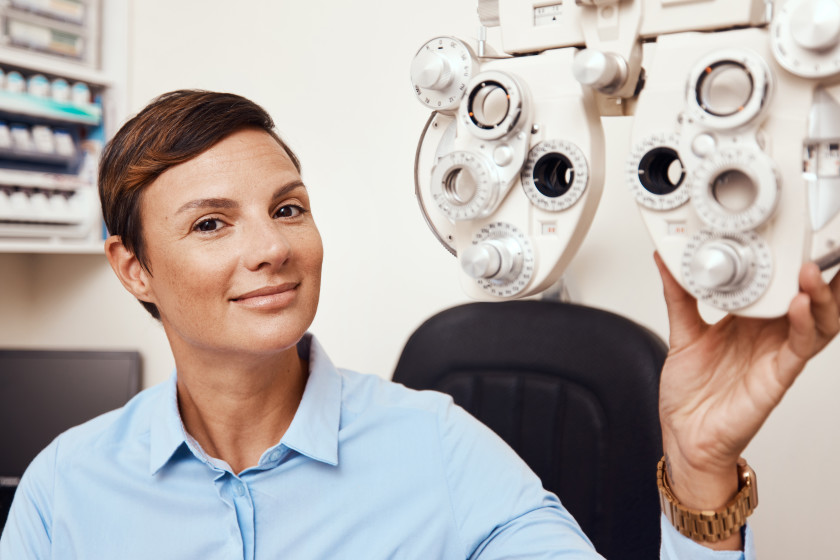50% OFF a Complete Pair of Glasses
*Restrictions apply. Click here for details.

Why Do Optometrists Dilate Your Eyes During an Eye Exam?
If this is your first time having a dilated eye exam—or even if you’ve had one before—you might be curious about why your pupils are enlarged. What exactly are eye doctors checking for? Which eye conditions can be detected? And how often should this exam be done?
Read on to learn more from Grene Vision Group. Our goal is to help you feel informed, confident, and comfortable throughout your comprehensive eye exam.
What is Pupil Dilation?
Pupil dilation is a standard component of a full eye exam. During this procedure, your optometrist uses special drops to temporarily widen the pupil, the dark center of your eye. This allows more light to enter and provides a clearer, wider view of the structures inside your eye.
A dilated exam gives your eye doctor the ability to examine the retina, optic nerve, and other key areas at the back of the eye. Early detection is crucial for maintaining long-term vision. Some eye conditions that may be discovered during dilation include:
Diabetic retinopathy
Age-related macular degeneration
Glaucoma
Retina detachments
Because many eye conditions develop gradually and without noticeable early symptoms, pupil dilation is an important tool for detecting issues early. In some cases, general health concerns such as diabetes may also be observed during a dilated eye exam.
What to Expect During Dilation and How Long It Lasts
Your optometrist will administer dilating drops in your eyes. Occasionally, an anesthetic drop is used first to make the process more comfortable. Full dilation usually occurs within 15–30 minutes. Eye color can influence the speed—lighter-colored eyes may dilate faster than darker eyes.
Once your pupils are dilated, they will react less to light. Your eye doctor will use a bright light and magnifying lens to thoroughly inspect your eyes, looking for signs of eye disease and evaluating overall eye health.
After the exam, you may experience temporary blurred vision or increased sensitivity to light. These effects typically fade within 1–2 hours, though the exact duration depends on the type of drops used. Your Grene Vision Group doctor will provide guidance on what to expect following your exam.
How to Prepare for a Dilated Eye Exam
Although the eye exam itself is usually brief, dilation can add 30–60 minutes to your visit. Plan for a slightly longer appointment. Many patients can drive afterward, but if you’re sensitive to light, have a long commute, or are having your first dilated exam, consider arranging for someone to drive you. Near vision may be blurry, and your eyes may be more sensitive to glare for a few hours, so schedule tasks accordingly.
Your eye doctor may provide disposable sunglasses for post-exam comfort, but bringing your own pair is recommended. If you wear contact lenses, bring your glasses, as your doctor may advise waiting before reinserting lenses to prevent damage. For children, expect a slightly longer visit and bring a snack or favorite activity to make the waiting time easier.
Before your appointment, write down any recent vision changes or symptoms—such as flashes, new floaters, headaches, or blurred vision—and any questions you want to ask. Proper preparation ensures your dilated eye exam is smooth, comfortable, and provides the clearest view of your eye health.
How Often Should You Get a Dilated Eye Exam?
The timing of dilated eye exams depends on factors like age, medical history, and personal risk. Your Grene Vision Group provider can recommend the schedule that’s right for you. Generally, a dilated exam may be advised every one to two years if you:
Are over 60
Are of African American heritage and over age 40
Have diabetes
Have a family history of glaucoma
These are general guidelines, but your eye doctor may recommend more frequent exams if you have existing eye conditions or other risk factors. Regular dilated exams are essential for early detection and long-term vision health.

Frequently Asked Questions About Dilated Eye Exams
Schedule a Dilated Eye Exam with Your Local Grene Vision Group
Although a dilated eye exam takes a little extra time, it is a simple, painless way to get a thorough assessment of your eye health. Regular exams help detect potential eye conditions early and reduce the risk of vision loss.
Find a Grene Vision Group location near you and schedule your dilated eye exam today!

 316-636-2010
316-636-2010 316-609-2177
316-609-2177